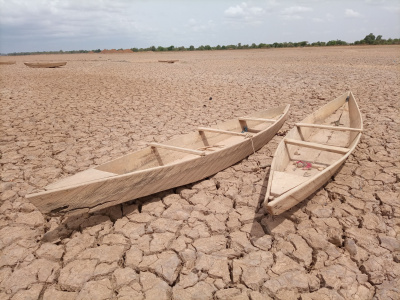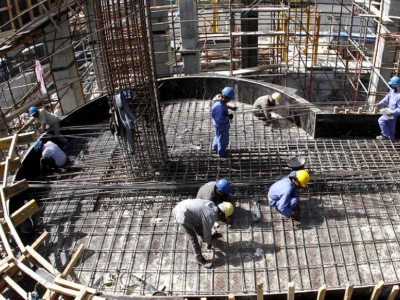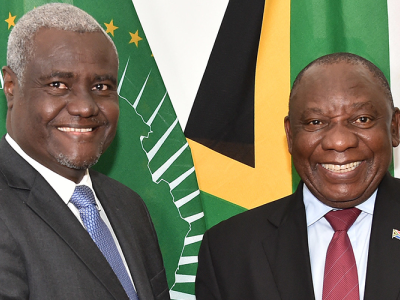
EPA Update, GREAT Insights, Volume 2, Issue 6 (September 2013)
African ACPs
EPA coordination meeting held in Libreville
African EPA negotiators met in Libreville, Gabon, from the 24th to the 25th of July under the chairmanship of H.E. Mrs Felicite Ongouori, Ambassador of Gabon in Belgium. EPA coordination meetings are regularly organized by the African Union Commission (AUC), with the aim of sharing information on EPA negotiations coordinating positions amongst RECs and regions.
This meeting’s importance was bolstered by the upcoming EU-Africa Summit in April 2014, ahead of which the African Union plans to craft a common position on EPAs to be presented there.
The meeting included detailed presentations by each EPA negotiating Region on the state of play of their respective negotiating process, and of the sticking points holding back the conclusion of an agreement. Each region expressed concern at the looming October 2014 deadline for the implementation of Interim EPAs. Other items on the agenda included cooperation on customs matter, the impact of the EU’s new GSP scheme and EPA implementation issues.
The AUC, for its part, presented the outcome of a mission to Brussels during which a number of proposals were made to the EU, including, inter alia, seeking a WTO waiver to extend unilateral preferences and the development of a joint matrix outlining contentious issues and possible textual compromise areas.
Disagreements on whether or not EPAs should be included on the agenda of the Africa-EU summit also surfaced in Brussels. The African Union (AU) is seeking to include the topic on the agenda of high-level discussions, while the EU is resisting such a move, arguing that it could highjack the summit and obscure other issues of discussion. For the AU, presenting a strong common position on EPAs at the meeting would be a significant advance in its goal to push the EU towards the flexibility it deems essential for development friendly EPAs.
On this basis, the Libreville meeting reflected on the development of a common African position ahead of the Africa-EU summit and “agreed in principle” on a roadmap on trade issues leading to the Africa-EU summit. Officials also agreed on drawing a matrix of contentious issues with textual proposals for their resolutions, while, at the same time, developing proposals for alternatives to EPAs. Further, an assessment of EPAs on the Tripartite Free Trade Area (TFTA) currently being negotiated is foreseen.
Note that apart from the RECs and the AUC, a number of international organisations attended the meeting, amongst which the United Nations Conference on Trade and Development (UNCTAD), the ACP secretariat, South Centre, the organisation of the Francophonie and ECDPM. A number of regional business organizations were also present.
EU Trade Commissioner De Gucht visits African Countries in July
EU Trade Commissioner Karel de Gucht visited four African countries in the month of July - Kenya, Botswana, Namibia and South Africa - and met the respective Trade ministers.
Commissioner de Gucht seemed eager to highlight that the EPAs provided a legal trading arrangement in line with the continent’s renewed growth prospects, and appeared hopeful that negotiations could come to fruition relatively soon. While in Kenya, he insisted that he had mandated his negotiators “not to come back empty-handed” from next rounds of negotiations, and added in Botswana that he hoped that the next SADC negotiating round would be the “final round in which we can resolve the outstanding issues”.(1)While in Namibia, de Gucht alluded to the latest SADC offer on Agricultural Market Access, a particularly important bone of contention in the current negotiations (see below), saying that the current SACU offer was still insufficient for the EU.(2)De Gucht’s remarks in South Africa, ahead of the sixth EU-South Africa Summit were more critical. He deplored South Africa’s recent decision to cancel bilateral investment treaties with some EU member states, stating that “there was little consultation with us” on the decision, and held that such a move would weaken commercial ties between the EU and South Africa. These remarks were made at the South Africa-EU Business Forum, organized by the South African the Department of International Relations and Co-operation. (3)The Commissioner also noted a host of restrictive measures against EU trade being considered by South Africa.
Economic Community of West African States
ECOWAS leaders call for Extraordinary Summit of West African Heads of State and Governments on the region’s Common External Tariff and EPA
ECOWAS leaders have called for an extraordinary summit of Heads of States and Government in Dakar in October in order to “deepen reflection” on the region’s common extrernal tariff (CET) and EPA negotiations.
The decision came about after the conclusion of the 70th Ordinary Session of the ECOWAS Council of Ministers that was followed by the forty-third ordinary session of the ECOWAS authority of heads of state and government, the highest decision making body in the West African economic region.
The decision to call for the meeting might signal that a compromise on the CET and on the way forward on EPA negotiations might still be in sight. It is noteworthy that Cote d’Ivoire’s Senior Minister in the Ministry of Foreign Affairs, Mr. Charles Koffi Diby, chairman of the ECOWAS ministerial council, renewed calls for a speedy conclusion of EPA negotiations. Cote d’Ivoire, the only ECOWAS country to have signed an Interim EPA in 2007 (Ghana has only initialed it, but not yet signed), is reportedly also the ECOWAS Member States most keen to sign a regional EPA.
The CET’s design is progressing well, with the region’s trade defense instruments finally drafted and having been put to the ministers for consideration and approval. An important step ahead seems to be modifying ECOWAS Member States WTO schedules in order to accommodate the CET’s duty rates.
To that effect, the ECOWAS commission undertook a mission to the WTO earlier this summer. ECOWAS is reportedly aiming for the next tri-annual period of renegotiations of bound tariff schedules at the WTO, which will begin in 2015. The WTO secretariat has agreed to provide technical assistance in these undertakings.
The sequencing of the Heads of State summit with current EPA negotiations is unclear. West African negotiators, which have not met their EU counterparts for a year and a half, are meant to meet in September to renew dialogue on the basis of their new Market Access offer standing at around 75%, a 5 percentage points increase from ECOWAS’ previous position.
Southern African Development Community
EU asks SACU to improve its agricultural Market Access offer
As we reported in our last issues, SACU was to come up with a new offer on agricultural Market Access by the 18-21 June negotiating round held in Brussels.
Sources report that the EU has declined the offer on the grounds that it was insufficient to match the market access the European block offers its Southern African counterparts. It has to be reminded that Agricultural products are of a sensitive nature for SACU countries, which voice strong concerns with regard to the impact of further commitments. Efforts and dialogue are underway to find a way out of the current impasse.
Similarly, the EU had also asked the SADC region to review its non-agricultural Market Access offer before engaging in new negotiations.
The parties have also agreed to postpone a possible service chapter to later in the process given the likelihood that a goods only agreement could be reached before the drafting of a service chapter. A framework text for further negotiation has been developed to that effect.
On Rules of Origin (RoOs), discussions on cumulation and administrative cooperation with regard to GSP beneficiary appear to have made substantial progress, with a new proposal from SADC being reviewed by the EU. Cumulation on agricultural products from countries with which the EU has an FTA also remains unresolved.
Further a compromise seems within reach for RoOs on fish. The ball is now in Namibia’s camp, who has to agree to remove a reference to a declaration stating that all fish caught in Namibian waters and landed in Namibian ports enjoy originating status.
On “traditional” contentious issues such as export taxes, MFN clause and infant industry provisions, both parties agreed to submit text or hold internal consultations before the next meeting, currently scheduled for the last week of September.
East African Community
EAC-EU EPA Negotiations at a crucial juncture, EAC proposes Ministerial meeting
As we had previously reported, the EAC and the EU are in the process of outlining issues to be deferred at the ministerial level for a possible compromise on high-profile issues currently holding back the conclusion of an agreement. The Ministerial meeting is currently scheduled for September.
The list of issues to be discussed at the ministerial level was further refined during a negotiation session held in Arusha on the 18th and 19th of July. These are: the MFN clause, cumulation with South Africa, time-bound asymmetry in Rules of Origin, and outstanding product-specific rules, wording on the relations to the Cotonou Agreement, issues of good governance in taxation, and finally the so-called “Turkey clause” concerning countries with which the EU has a Customs Union agreement.
The list could further expand if other matters are not settled at technical and senior official levels in rounds to be held ahead of the Ministerial. This is notably the case for text that has not been agreed upon in the dispute settlement chapter.
On the issues still outstanding, some stand out for their important implication and longstanding controversial nature. The EAC has, as we had reported last year, linked the outcome of agricultural text to the article on export taxes. Retaining the maximum flexibility in the use of export taxes is a priority for the EAC, an issue where the EC is seeking constraining provisions. The situation is essentially reversed for the EU, which rejects the inclusion of domestic support in the agreement. The EAC proposal would exchange the lack of biding commitments on domestic agricultural support and export subsidies to the scraping of the text on export taxes.
It is unclear if this issue has been delegated to ministerial level, which could signal that negotiators could try to hammer out a deal before the Ministerial.
Further, the MFN clause stands out as a deal-breaker. It would provide for the “automatic” (depending on the wording) extension of any additional concessions made by the EAC in another bilateral agreement. The EAC is proposing to include language that would weaken the “automatic” granting of additional commitments, whereas the EU is arguing for a solution whereby not all countries would be covered by this clause.
It remains to be seen whether the two sides can muster enough will to compromise on these issues to seal a final deal on what has been a 10 year long, at times acrimonious process. A breakthrough during the ministerial would also significantly reshuffle the cards on both sides months before the EU-Africa Summit. The EAC-EU EPA could be the first full EPA signed with an African region.
Pacific ACPs
Pacific EPA talks break down amidst public row
Pacific EPA talks have been suspended after the last negotiating session in Brussels in July. The suspension comes after a series of unusually harsh public exchanges of words between the European Commission and authorities in the Pacific, with both sides blaming each other for the slow pace of negotiations and lack of flexibility (4).During the round, held in Brussels on July 5th, it became apparent that parties would not find common grounds on provisions relating to the sustainable management of fisheries in the Pacific ACP countries (PACPs). The PACPs maintain their position that any dispositions on fishery management would have to be undertaken in the framework of Western and Central Pacific Fisheries Commission, not through legally biding bilateral provisions. The Vanuatu Daily posts also reports that the Island wishes to maintain 30% of its tariff lines uncovered by the agreement, against the EU request for 80% coverage. The longstanding negotiations on the so-called global sourcing provision are also still unresolved.
Pacific countries have reportedly asked for another meeting in September, which was not accepted by the EU. The Europeans are invoking the need to consult with stakeholders. It is unclear when the talks will resume, especially as Pacific leaders had set 2013 as a “deadline” to reach an agreement.
Quentin de Roquefeuil is Policy Officer in the Economic Governance, Trade and Regional Integration, and Food Security Programmes at ECDPM.
Footnotes
- http://europa.eu/rapid/press-release_MEMO-13-687_en.htm and http://en.starafrica.com/news/sadc-eu-trade-negotiations-inch-closer-to-conclusion.html
- http://europa.eu/rapid/press-release_MEMO-13-695_en.htm
- http://www.bdlive.co.za/business/trade/2013/07/17/south-africa-gets-tongue-lashing-at-sa-eu-business-forum
- See our previous EPA update
This article was published in GREAT Insights Volume 2, Issue 6 (September 2013).



